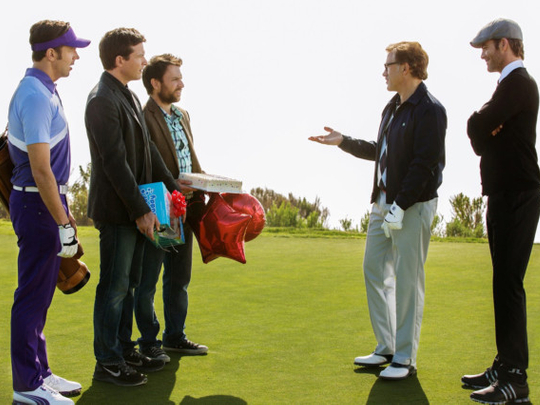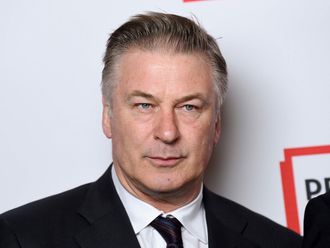
For nearly three decades, Austrian-born Christoph Waltz was a jobbing actor in Europe. He finally came to Hollywood in 2009, and in the next four years he won two Oscars.
On December 1 he will receive his star on the storied Hollywood Walk of Fame.
Not bad for a boy from Vienna.
But despite his evident success, the 58-year-old insists life is no simpler now he’s on the Tinseltown A-list.
“This is a fight ... life isn’t easier now with two Oscars,” he said in an interview, while promoting his latest film Horrible Bosses 2, out in the UAE on Thursday.
Cultivated, attentive, and with a piercing gaze, Waltz is nonetheless enjoying the fruits of his success.
His career began in 1979 in his native Austria, after catching the acting bug from his parents: his mother Elisabeth was a costume designer and father Johannes a stage builder.
His grandparents had been actors, and he followed them by studying at the Max Reinhart Seminar at the University of Music and Performing Arts in Vienna, followed by the celebrated Lee Strasberg institute in New York.
His small-screen debut was in TV movies and German-language series like Tanz Mit Dem Teufel (Dance with the Devil) or Feuer und Schwert (Fire and Sword) based on the legend of Tristan and Isolde.
Over the following years he combined work in film, TV and theatre. “I really was constantly moving from countries, places, mentalities, languages,” he said. “You move out as a young man, you conquer this and conquer that.”
Conscious that the German language was limiting his range, he decided to leave for London and Paris, where he said he “discovered tourism of a very, very high level.”
“I discovered the place to live really is where you do what you do, with the people you like to do it with. And this place is here, of course,” he said, speaking in Hollywood.
Oscars left in corner
His most important new friend in Hollywood was Quentin Tarantino, the director of “unorthodox methods of navigation” as Waltz describes him.
The Reservoir Dogs and Pulp Fiction filmmaker gave Waltz the “gift” of his two most famous roles so far: Colonel Hans Landa in Inglourious Basterds (2009) and doctor King Schultz in Django Unchained (2012).
In both cases he won the Oscar and Golden Globe for best supporting actor, prizes which catapulted him into the Hollywood stratosphere.
Winning the prizes “is an honour, it’s flattering, and a wonderful thing to be awarded,” he said. “But yet you have to keep doing what you do, and try to do it well. Keep fighting for getting good roles.
“That’s all it is about,” he added.
He added that he keeps his golden statuettes in a corner. “If you don’t put it somewhere and leave it there, if you always carry it in front of you, you will end [up] having a problem,” he said.
Since Inglourious Basterds, he has appeared notably in Carnage by Roman Polanski and The Green Hornet by Michel Gondry (both in 2011), and given his voice to animated films Epic (2013) and this year’s Muppets Most Wanted.
He will soon be seen in Tim Burton’s new movie, Big Eyes.
Today he is promoting the comedy Horrible Bosses 2 with Jennifer Aniston. He plays Bert Hanson, a businessman at odds with trio Kurt (Jason Sudeikis), Nick (Jason Bateman) and Dale (Charlie Day).
Of comedy, he quips: “As long as you take it seriously, you can do it.”
“But in a movie, because comedy is so much timing and rhythm, all of that is most established in editing.
“I can say a complete straight sentence, just neutral and straight, and a good editor can turn it into a funny or sad thing. Because that’s the beauty of movies, nothing works in itself.”
Over his long career Waltz said he has had some horrible bosses himself. “I had more than horrible, abusive, degrading, really brutal, bad directors,” he said.
But he added: “Now it would be different because I would tell them to get lost.”
Excerpts:
What drew you to this movie, and playing such a manipulative boss?
There were beautifully hidden spots in the script that say a lot about the world we live in, and say a lot about that we actually would like to live in a different world, so that was already an interesting aspect that attracted me. But then there’s a lot of comedy business going on that didn’t appeal to me at first in the script, but knowing what it would turn into, and talking to the people who would turn it into a movie, was completely convincing.
How did you connect to Bert Hanson’s ruthless motivations?
That’s what I do for a living, imagination is a wonderful, wonderful device, and usually we call reality what goes against our imagination, but that’s not true. Imagination is a reality. I have the wonderful opportunity to work in a profession where you can actually act it out, so imagination is really the most important prerequisite.
What did you get to explore in this film that you’ve never been able to do before?
Not so much new stuff or uncharted territory, but the combination to be this very serious, or to show this very serious approach to life and business, vis-a-vis three people who don’t seem to get it at all, and who actually go off on their little rampages over everything. That’s kind of a combination I hadn’t done before. Usually when you play such a serious character, the reply is on the same level, but that’s what makes comedy, that the reply is on a different level.












